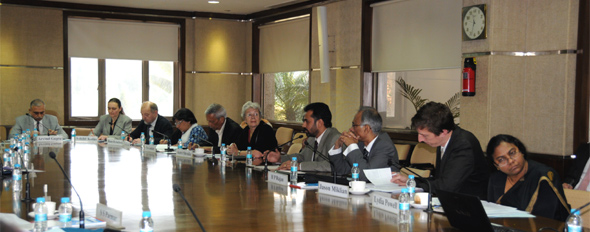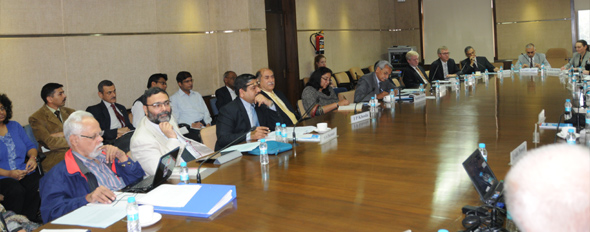
- This event has passed.
IDSA-PRIO Workshop on Global Governance and Resource Use: The Case of the Arctic
November 19, 2012
Venue: IDSA, New Delhi
The Institute of Defence Studies and Analyses (IDSA), New Delhi and Peace Research Institute Oslo (PRIO) hosted the roundtable on “Governance and Resource Use: The Case of the Arctic” on November 19, 2012 at the IDSA campus. The day-long conference comprised of two sessions, each with 4 speakers. Dr. Arvind Gupta, DG IDSA and Dr. Åshild Kolås, Research Professor, PRIO gave the inaugural speech.

Session 1
The opening session focused on the Arctic. Leiv Lunde, Fridtjof Nansens Institutt, Norway highlighted the reasons why the Arctic is attracting global interest. Reasons cited were several including growing economic interest because of climate change, immense resource potential, new emerging transport routes (like the Northern Sea Route) and gradually strengthening governance mechanisms. He also pointed out that the Arctic region is currently faced with low international tension. In addition he also discussed the role of Russia as a major player. Concern was expressed by him over the poor infrastructure along the Russian Arctic coast. In conclusion, he recommended that India join the Arctic Council as an observer, while at the same time investing political energy in other institutions. Rune Rafaelsen, Secreatry General of the Norwegian Barents Secretariat in Kirkenes pointed out that the influence of people living in the Arctic and that the governance of the regions’ resources cannot be underestimated. He recommended that a new Secretariat be built for managing the Arctic resources. Captain (N) Gunnar Heløe, Norwegian Ministry of Defense, delineated that the High North will be Norway’s most important strategic priority area in the years to come. Dr Rafaelsen and Captain Heløe both pointed out that the delimitation line as per the Norwegian-Russian agreement (signed and ratified in July 2011) was the result of 40 years of negotiation.
In a quick response to the India’s position, Amit Narang, Deputy Secretary, United Nations Division, Ministry of External Affairs, Government of India emphasised that the Arctic is of global rather than regional interest and India has been actively engaged in the region. He stated that India had submitted its application to Sweden for Observer Status in the Arctic Council on November 6, 2012. Cdr Sarabjeet Parmar, IDSA posed the question, viz. whether the governance of the Arctic was really settled, since the agreement between Russia and Norway on Svalbard was only a bilateral one. In his view, Russia would rely increasingly on fossil fuels from the High North which is why it had been strengthening its cooperation with Norway. He also brought out the issue of conflicting continental shelf claims and the possibility of conflict arising due to sovereignty issues arising from the claims. The difference in opinion between the US and Canada on the issue of international waters and internal waters was highlighted as an example. Discussing the standing of the Arctic Council he brought China into the discussion. He pointed out that China’s application for a permanent status as an observer in the Arctic Council had been rejected in 2012 by Norway but reiterated that the Council should view the applications for membership from non-Arctic nations in a more holistic way. H.P. Rajan, former Director, Office of Legal Affairs, UN, and former Adviser to the Dpt of Ocean Development, GoI, provided technical insights about the Law of the Sea. All Arctic States with the exception of the US are parties to it and all Arctic countries including the US agree that the legal regime contained in the UNCLOS applies to the Arctic as well. With Arctic meltdown, while new shipping routes will open up, the rights of States for various types of passage (innocent, transit, archipelagic or free passage) are already set out in UNCLOS; what needs to be worked out are the practical modalities, which could mostly be bilateral, but needs to be applied uniformly to other States also. As for resources, the landmass underneath Arctic is almost entirely the continental margins of 5 Arctic States, namely, Russia, Norway, Canada, Denmark (Greenland) and the US. Of these, Russia and Norway have already made their submissions to the Commission on the Limits of the Continental Shelf, and received recommendations for delineation of the outer limits. Canada and Denmark are expected to make their submissions in 2013.
Discussion
Olav Schram Stokke, Research Professor, FNI, remarked that the Arctic Council is not dealing with sovereignty and security, but is rather coordinating fact-finding, capacity advancement, and serving as an information clearing house on priorities of decision-makers. This, according to him, is a good reason for non-Arctic states to become observers in the Arctic Council. Captain Heløe flagged China’s interest in Greenland. The Arctic Council according to him is limited since it does not take into account security issues. Astri Suhrke while referring to a recent article by Oran Young made the point that pursuing Observer status should not be the primary goal but this should be a springboard for a broader multilateral cooperation platform. In response to Suhrke’s comment, Rafaelsen argued that the Arctic Council at least provided a platform to people living in the region.
In his chairpersons’ remarks, Arvind Gupta asserted that two different views about the importance of the Arctic Council had emerged; one that it is an important institution, the other that it is not. He noted that in the case of the Arctic, the resource commons only begin outside the 200-mile economic zone of all coastal states, which constitutes a very limited area.

Session 2
The Chairperson Kristian Berg Harpviken, PRIO introduced the 2nd session by stating that the expectation of new hydrocarbon findings in the Arctic is important to at least three of the priority areas highlighted at Rio+20, namely energy, oceans and disaster readiness. He added that global governance issues, especially sustainability and access to resources, will strongly define the future and will create differing views. Mukul Sanwal, ORF emphasised that what is happening in the Arctic has implications on the rest of world and vice-versa. He claimed that the Arctic moderates circulation systems of oceans and atmosphere changes. He suggested that the United Nations should have a role to play; UNEP should formulate an ecological assessment and collaboration around, and review of models and their critical components. P K Gautam, IDSA expressed concern over issues of governance of the Arctic. He hoped that India would soon get observer status and would contribute to enhancing understanding among states with respect to the Arctic. Shebonti Ray Dadwal, IDSA, highlighted the limitations of energy governance organisations such International Energy Agency, Organization of the Petroleum Exporting Countries, UNEP and UNFCCC. Countries like India, she urged, should have representation in governance institutions. In addition, she recommended that there is need for all organisations to get involved in governance issues and not just the governments. Lydia Powell, ORF primarily discussed the issues and challenges of energy availability and governance in India.
Dr Harpviken in his chairperson’s remarks summed up the discussion by saying that change in the Arctic is more rapid than anyone had expected. At the same time the willingness and ability to exploit resources seemed to be less than expected. Changes elsewhere had driven changes in the Arctic rather than vice versa. He concluded that the Arctic may not be as special as people often presumed, which was brought out by the debate. He agreed that despite a consensus not being established, a lot had been learned about the positions and views.
(Report prepared by Madhavi Marwah, Intern, IDSA)







